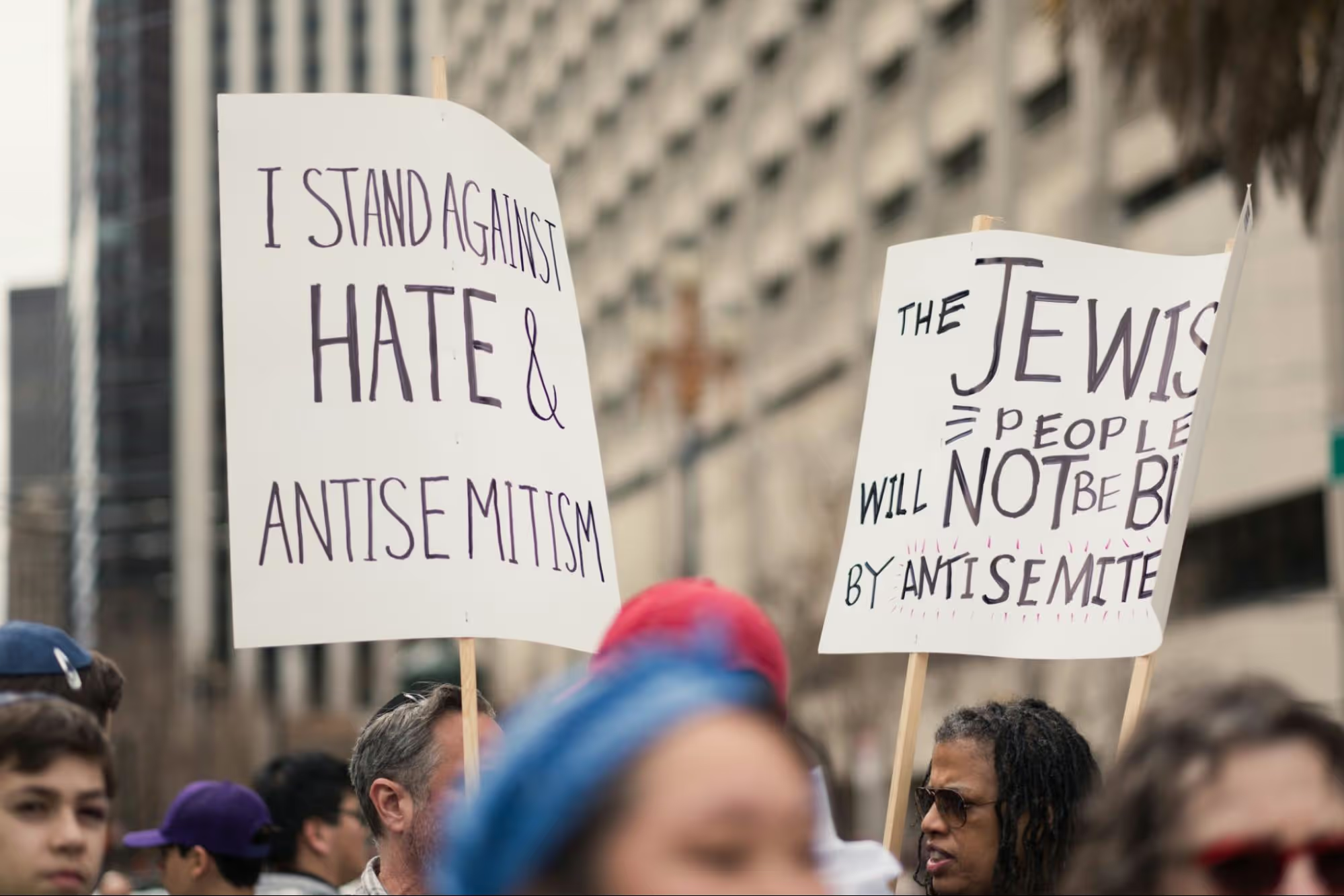
Research
Resources on Antisemitism for Interfaith Coalitions
From Nazi salutes to violent attacks in D.C. and Boulder, it’s clear that antisemitism continues to be an urgent threat to Jews and to the health of our democracy. We must be united as an interfaith coalition against all forms of antisemitism.
Unfortunately, efforts to meaningfully counter antisemitism have been hindered by the Trump administration and its allies. They use antisemitism as a pretext to advance their repressive agenda, leading to significant cuts in higher education, the promotion of figures with histories of antisemitism, and the revocation of visas to thousands of college students. Though many Jewish organizations have come out forcefully against their approach, the administration still loudly claims the mantle of combating antisemitism. By forcing potential allies to Jewish communities to come out in opposition to efforts that falsely claim to address antisemitism, they exploit antisemitism as a wedge issue to divide progressive coalitions and use Jewish communities as scapegoats for authoritarianism.
Given this confusing landscape, it’s crucial we uplift resources that offer clarity on these pressing and important matters. By positioning Jewish safety in opposition to the rights of other religious minorities, the administration is trying to undermine broad multi-religious solidarity to attack democracy and advance one narrow understanding of antisemitism and Jewish identity. Far too often, the administration relies on a contested and incomplete understanding of antisemitism to target immigrants, attack Palestinians, Arab Americans, and Muslims, and dramatically restrict our crucial First Amendment rights. Here, we recommend some resources for further reading and education to equip interfaith coalitions with helpful tools for recognizing and addressing antisemitism.
This is not an exhaustive list of all resources in the field, and we encourage readers to continue learning and educating themselves about this important issue.
In this resource, Bend the Arc offers suggestions on how to reframe how we think about antisemitism to better understand it as part of a broader system of oppression tied to authoritarianism. Rather than treating antisemitism as inevitable, they suggest using the metaphor of “machinery” to explain how it is consciously created and what it would take to meaningfully dismantle it. Their core message is that Jewish safety is intertwined with the safety of all people. Widely used across faith and justice movements, the guide promotes a hopeful, intersectional approach that offers meaningful tools to counteract antisemitism while building an inclusive democracy with long-term safety for all.
A Very Brief Guide to Antisemitism
T’ruah, an organization which works with rabbis from across the United States to promote equality and justice, published a resource guide on how to explain and combat antisemitism. The guide offers information about the various definitions of antisemitism, some common antisemitic tropes, and ways to differentiate genuine antisemitism from criticism of Israel, as well as insight into when criticism of Israel crosses over into antisemitism. The guide exists as a resource for communities to consult as they develop their own strategies for combating antisemitism.
In April, the Jewish Council on Public Affairs brought together some of the leading Jewish organizations in the country—including the Religious Action Center of Reform Judaism, National Council of Jewish Women, American Conference of Cantors, Central Conference of American Rabbis, HIAS, Rabbinical Assembly, Reconstructing Judaism, Reconstructionist Rabbinical Association, and the Union for Reform Judaism—to put out a statement rejecting the false choice between confronting antisemitism and upholding democracy.
The language in the statement offers a helpful guide for allies as they seek to follow the lead of prominent, diverse American Jewish voices. The statement reads in part:
“We reject any policies or actions that foment or take advantage of antisemitism and pit communities against one another; and we unequivocally condemn the exploitation of our community’s real concerns about antisemitism to undermine democratic norms and rights, including the rule of law, the right of due process, and/or the freedoms of speech, press, and peaceful protest.”
Too often, particularly amid conversations on Israel-Palestine, antisemitism and Islamophobia are presented as competing issues rather than two forms of hate that need to be addressed together. As one of the foremost organizations working to combat anti-Muslim bigotry, The Shoulder to Shoulder Campaign has consistently illustrated how to do so while vigorously condemning antisemitism in all its forms. In one of their most valuable offerings, they created a report which offers guidance to interfaith leaders on how to resist dehumanization in response to the horrific violence engulfing the Middle East.
They recommend that faith leaders affirm the inherent human dignity of all people, resist collective blame, avoid conflating distinct identities, and recognize that various terms mean different things to different people. Their report is a meaningful call to address how hate and bigotry shows up against all people—Arab, Muslim and Jewish alike.
7 Policy Recommendations for Combating Antisemitism in the United States
In October 2025, the Center for American Progress published an issue brief extending and building upon the Biden administration’s U.S. National Strategy to Counter Antisemitism from May 2023. In this issue brief, CAP lays out seven key policy recommendations for combating antisemitism. Like many of the other approaches included here, they emphasize that antisemitism increases when all forms of hate are allowed to flourish. To combat this critical issue, they suggest expanding education about antisemitism and Jewish history, pushing back against book bans, and fully funding programs supporting hate crimes prevention, among others. As their issue brief explains, “The National Strategy to Counter Antisemitism provides a strong foundation for action and a clear road map for all levels of government and the private sector to combat it. Building on the strategy to ensure the safety and well-being of the Jewish community is urgently needed, as are the collateral benefits of promoting empathy and understanding across our citizenry.”
The State of Antisemitism in America 2024
As one of the largest Jewish organizations in the United States and around the world, the American Jewish Committee has taken a clear and consistent focus on antisemitism. In 2024, they commissioned a survey to gauge a nationally representative sample of American Jews on their thoughts, feelings, and experiences of antisemitism. They found that 54% of American Jews see antisemitism as a serious problem, 60% think it has increased dramatically in recent years, and 73% of American Jews think Jews are less secure in the United States than in the previous year. Their data helps add helpful context for why the fight against antisemitism is so important.
Fighting Antisemitism, Protecting Democracy: A Strategy for the Trump Era
In response to some of the public confusion around antisemitism and its political misuse, the Nexus Project developed a new report to make sense of how antisemitism functions in our current political climate in 2025. Featuring essays by noted scholars and advocates, the report dives into strategies to combat antisemitism while pushing back on attacks on free speech and democratic inclusivity.
They write, “Fighting Antisemitism, Protecting Democracy: A Strategy for the Trump Era presents a comprehensive approach to protecting Jews and the democratic rights and liberties that truly keep us safe. It is anchored in the understanding that fighting antisemitism requires defending democracy, building solidarity, ensuring concrete measures for Jewish security, and promoting education about Jewish history.”
Diaspora Alliance is an organization that works with Jews and other diasporic and minority communities internationally to fight antisemitism. In 2024, they released a fact sheet titled “Antisemitism Explained”. The fact sheet offers an overview of how they understand antisemitism, its impact on marginalized communities, its ties with other forms of bigotry and violence, and their vision of how to combat it. The fact sheet also discusses the phenomenon of philosemitism and the misuse of antisemitism by authoritarian regimes to advance other kinds of prejudice. As they write, “Fighting antisemitism is part of the larger project of creating a just democracy.”
Resource Guide on Antisemitism
The Southern Poverty Law Center developed this resource to illustrate how antisemitism undergirds much of the ideology on the far-right. As they showcase, there has been a growing rise of antisemitic hate groups, antisemitic attacks, and broader white nationalist movements. They critically show how these far-right movements integrate their antisemitism with attacks on other minority groups, particularly LGBTQ+ communities and Muslims. Building off of Eric Ward’s noted essay, “Skin in the Game,” their research highlights how antisemitism fuels white nationalism by providing a foundation for authoritarian ideologies through exclusion and conspiratorial thinking.
For more on their work on antisemitism and on countering hate more broadly, please also see their latest dispatch from September 2025 and their report on hate and extremism in 2024.
Transcript

The Critical Need for Humanist Inclusion
Humanism is a non-theistic worldview centered on ethical living and human responsibility, long protected as a religion under the First Amendment. A recent Texas court ruling threatens these protections by excluding non-theistic beliefs. Interfaith Alliance is defending equal religious freedom for Humanists and all belief systems.
.jpg)
Trans Rights and Religious Freedom
Over the past few years, we have witnessed an alarming increase in prejudice against transgender people and attacks on the LGBTQ+ movement. This prejudice has manifested in several ways: bathroom bills denying access based on gender identity, denial of medical care for critical health services, and alarming rates of hate crimes and violence. Unfortunately, much of this rise in hatred has been fueled by religious rhetoric. To explain why the pro-democracy faith movement proudly supports trans people and all members of the LGBTQ+ community, we offer answers to some of the most commonly asked questions about religious freedom and the trans rights movement in the United States.
What is Happening with the Johnson Amendment?
Answers to commonly asked questions about the Johnson Amendment and the IRS legal filing arguing that religious leaders could endorse political candidates in houses of worship without losing their tax-exempt status, officially breaking with more than seventy years of legal precedent prohibiting churches and nonprofits from officially endorsing political candidates.

